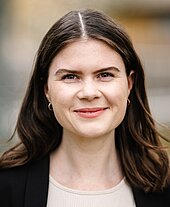Ruppert, Linda
Dissertation topic: "Form follows Ethics. Narrative Strategies of Polyvalence in Ethical-Political Texts of Contemporary German-Language Literature." (working title)
Contact address at the University of Würzburg:
Chair of Modern German Literature I
Am Hubland
97074 Würzburg
First supervisor: Prof. Dr Stephanie Catani
Second supervisors:
Prof. Dr Maximilian Bergengruen
Prof. Dr Stephanie Waldow (Univ. Augsburg)
Class in the Graduate School: "Philosophy, Languages, Arts"
Doctorate in the Graduate School from WS 2025/26.
Abstract:
Recent research contributions refute the thesis that contemporary political literature primarily communicates one-sided moralising messages via the level of histoire. This dissertation is dedicated to the narrative strategies, still under-determined in literary studies, which enable polyvalence in these texts via the aesthetic realisation of ethical principles at the level of discourse (research thesis). This is based on art-philosophical and narrative-theoretical considerations on the political potential of literature and the ethical relevance of formal characteristics of openness of meaning. Methodologically, the work concretises five inductively formulated narrative strategies in a tagset with which the corpus of primary texts of recent German-language contemporary literature in CATMA is digitally annotated. Strategies that cross the media-analogue narrative boundary into the digital realm are also taken into account.
The results of the digital analysis are systematically reported and supplemented by exemplary close readings. In addition to the implicit poetologies, the dissertation examines the explicit drafts of ethical-political writing in the present: using authorial epitexts (interviews, poetics lectures, etc.), it traces how the authors refer to the hegemonic model of engaged (post-war) literature. In this way, the research project takes into account the close association between the ethical-political text and the author as well as the hitherto barely considered connection between political writing styles in the present and the structural category of gender. The boundaries of literary studies will be crossed in the direction of ethics, philosophy of art and digital humanities






